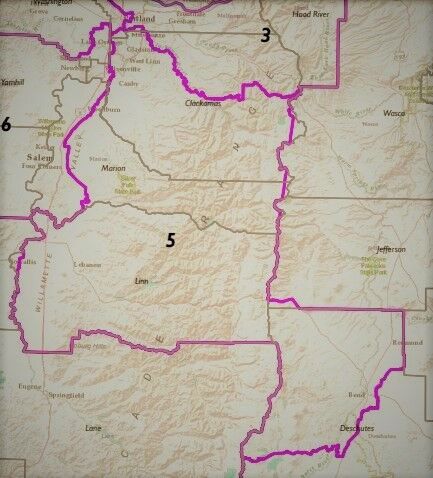Republicans seeking to flip congressional seat speak in Bend
Published 1:24 pm Friday, April 22, 2022

- A map of the newly realigned 5th Congressional District that stretches from Portland, across the Cascades, to Bend
BEND – Four Republicans runnng in the May primary for a congressional district that stretches from Portland to Bend took part in a forum Thursday to air their views on issues before Congress.
Lori Chavez-DeRemer, Jimmy Crumpacker, Laurel Roses, and Madison Oatman took part in the event hosted by the City Club of Central Oregon and the League of Women Voters. A fifth GOP candidate, John Di Paola did not take part.
The candidates are running in the 5th congressional district, represented by incumbent U.S. Rep. Kurt Schrader, D-Canby.
The boundaries of the district were significantly changed under a redistricting plan approved by the legislature last year. the new district includes parts of Benton, Clackamas, Deschutes, Jefferson, Lynn, Marion and Multnomah counties.
Less than half of Schrader’s current constituents live in the new district, which runs from southern Portland, across the Cascades at the Santiam Pass to take in Bend and Redmond in Deschutes County.
Schrader is facing a Democratic primary challenge from Jamie McLeod-Skinner of Terrebonne. The winner of the May 17 contest will advance to the general election to face the Republican primary winner.
Lori Chavez-DeRemer
Chavez-DeRemer served as mayor of Happy Valley for eight years, and owns a health care business.
As a congressional candidate she said her top priorities include inflation, energy policy and dealing with immigration at the border with Mexico.
When it comes to providing congressional funding in response to COVID-19, Chavez-DeRemer said the the federal response has been faulty. She said measures taken by the government in the wake of the pandemic over the past two years have fallen short of protecting Americans and resulted in further harm.
“I think we are going to pay that price over the next two to five years when we see the real outcome of, again, power and control by the federal government,” Chavez-DeRemer said. “So, to put more federal funding and put trillions more dollars into this already bad economy is not going to benefit Americans again, and it certainly is not going to benefit Oregon.”
Chavez-DeRemer said she does not support amnesty for the more than 10 million undocumented immigrants who she said are “living in the shadows” in the U.S.
“We have to get on a fast track to get them into this country, but amnesty is not the way to do that,” Chavez-DeRemer said.
Jimmy Crumpacker
Crumpacker was born and raised just outside of Portland, then studied government at George Washington University in Washington, D.C. For 16 years he worked on Wall Street before returning to Oregon and moving to Bend. He previously ran for the 2nd Congressional District seat won by U.S. Rep. Cliff Bentz, R-Ontario, in 2020.
Crumpacker said his top priorities include dealing with the rapidly rising inflation, regulating Oregon’s forests to help mitigate the effects of wildfires, and controlling immigration at the Mexican border.
When asked about how Congress can help Oregon manage its water resources, Crumpacker said the federal government should prioritize farmers, especially during a drought.
“I’m extremely worried with our forest management,” Crumpacker said. “Unfortunately, for the last 30 years, the federal government has done an incredibly poor job managing our forests…We cannot allow a million acres to burn every year. It’s dangerous for our citizens, for breathing in the air. It’s really awful for tourism.”
Crumpacker said having a wall at the border with Mexico does not do enough to stop undocumented immigrants.
“So, therefore this huge flow of illegal immigrants is going to continue to come across the border,” Crumpacker said. “And without having border security properly funded, unfortunately I think it’ going to get much worse before it gets better.”
When it comes to Oregon’s homelessness crisis, Crumpacker said adding more funding oes not necessarily solve the problem, and, in some cases, make the issue worse.
“We now have a homeless industrial complex,” he said, “where we are spending millions and millions of dollars and it doesn’t appear as though there’s enough accountability.”
Laurel Roses
Born and raised in Clackamas County, Roses grew up in Boring, east of Portland. Her top priorities if elected include controlling the flow of illegal drugs from Mexico, giving parents more power in how they educate their children and giving state governments more power.
Roses said different approaches should be taken on immigration depending on each type of situation. She said she’d be in favor of providing permanent residency to law abiding immigrants who have been in the country for a certain period of time and who are not on government support.
“Although, there are some people who are illegal aliens, but they’ve lived here for 20 years. They have families. They have kids in school. They speak fluent English. They are gainfully employed,” Roses said. “You cannot deport all of those people. That is unkind, and it’s not the American way.”
Roses said her policy would be to allow certain immigrants residency, but they wouldn’t be eligible to vote or apply for citizenship.
“They’ll never be able to apply for citizenship, and they’ll never be able to vote, but they can stay here and come out of the shadows and live a happy productive life,” Roses said.
Madison Oatman
Oatman is from Bend and works as a project manager in the construction industry. His top three priorities if elected include term limits for Congress, preserving the Second Amendment, and keeping government from moderating free speech.
Asked about federal water policy, Oatman said the less involvement the better.
“The federal government does not need to be involved in what happens in Central Oregon,” Oatman said. “Our water issues need to be managed better, but that’s going to have to come from the private sector or local level government, at that point we need to elect the people who are going to deregulate.”
Oatman said the private sector is best equipped to manage water resources and coming up with solutions to climate issues.
On whether or not to require universal background checks for firearm purchases, Oatman said he is all for law abiding citizens’ right to legally bear arms.
“I am all about people having guns and legally having guns,” Oatman said. “But at the same time, we can’t stop criminals from being criminals… It’s part of society, and we live in a world that has always had criminals and people doing bad.”
Instead of making it more difficult to buy guns, Oatman said, funding and supporting police forces would be a viable approach to curbing criminal activity in places like Portland.
Joe Siess is a reporter for The Bend Bulletin. The Oregon Capital Bureau contributed to this report.





